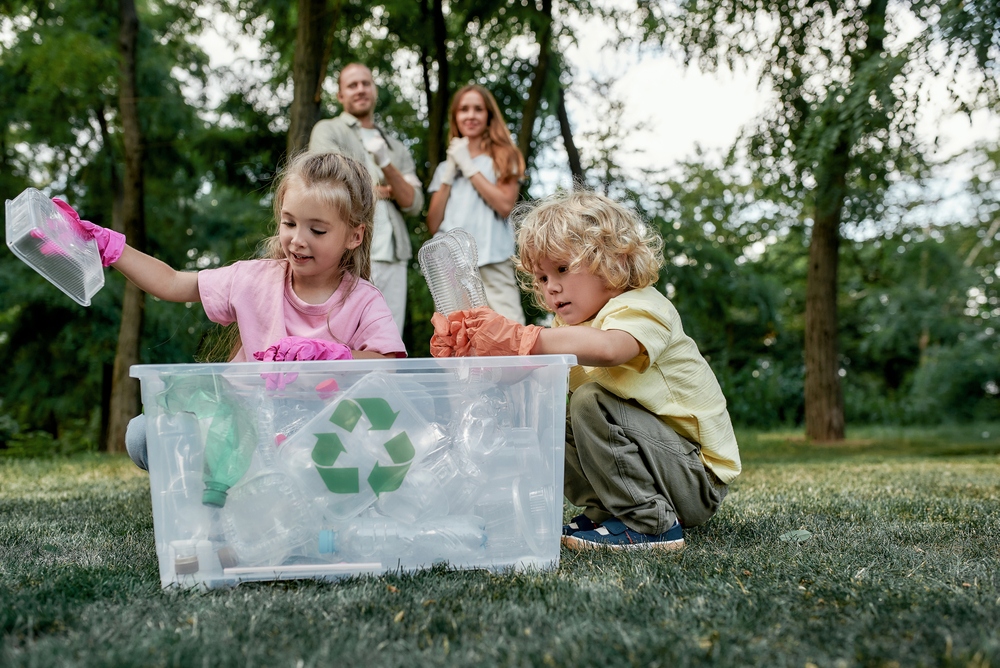
Sustainability
Sustainability
11 February, 2026

As parents, we don’t just have a responsibility to ensure the safety and wellbeing of our children as they grow up – it’s also our job to make sure they leave the world better than they found it. Here are 10 ways to do exactly that.
Point out examples of non-sustainable behaviour
There are so many examples of how not to be sustainable, like rubbish left on the ground or excessive packaging at the supermarket. It sounds simple, but pointing these things out to your children is a great way to get them thinking more eco-consciously. Next time you’re at the park or the beach, subtly alert your little one to any rubbish you come across and explain how it can affect wildlife.
Teach them how to recycle (properly!)
Things like bread bags, bubble wrap, food wrappers and plastic bags are all a no-go for your yellow recycling bin, but do your children know that? A great way to teach them if a plastic item can be recycled is to perform the ‘scrunch test’. If you can scrunch the plastic material up into a ball easily, it can’t go in the yellow bin. It’s a fun, satisfying way for them to learn a lifelong skill!
Get crafty with your recycling bins
Nothing puts the fun in recycling like a craft activity, so have your children spend a weekend or afternoon decorating their own recycling bins – they should even adorn them with examples of the materials that can go in each. Tape, paint or draw things like paper, cardboard, firm plastics, metal and glass on the outside of the container so your children know exactly what they can recycle.
Make a worm farm
They may not be the puppy your children have been begging you for, but a worm farm is a great way to reduce your impact and teach your children about sustainability. The little worm workers turn you’re the food scraps and other organic material that would otherwise waste away in landfill into a rich plant fertilizer, which you can use in your own garden. You can pick up everything you need for your worm farm at Bunnings!
Set up a compost system
If worms freak you out, why not set up your very own compost bin? Or, better yet, help your children’s school or kindergarten make their own? Composting is a great way of showing children the process of decomposition, and encouraging them to think critically about reducing the amount of rubbish that we bin (which in turn can end up in our earth, water and even air!).
Experience nature
We are lucky enough to be surrounded by lush forests, secluded beaches, brilliant bushland and countryside, so why not take the children out and about and show them how much fun can be had while enjoying nature? There are so many places within driving distance of Brisbane and the Gold Coast that you can explore.
From the garden to the plate
Children learn best when engaging all their senses, and with gardening, they can touch and feel the dirt, seeds and flowers, see the plant grow into food and eat the rewards of their hard work. They won’t just become more eco-minded – researchers have found that children who learn to grow vegetables are more likely to eat healthily.
Explore sustainability through play
The key to raising eco-conscious children is to get your children excited about sustainable living, and there are few better ways to create excitement than through play. Thankfully, there are a number of fun arts and crafts that can be done using items you already have at home – and items that may have ended up in landfill. We listed a few of our favourites right here.
Encourage sustainable habits
We’re all practiced at bringing reusable bags when we go shopping, and many of us probably bring a reusable cup with us on our coffee runs, but why stop there?! Whether it’s bringing your own containers when you order takeaway or packing a reusable straw in your car or handbag, your children will see that you prioritise sustainability, and they should, too.
Be a good role model
On that same note, there are so many other ways that children learn from us – and we can use this to our advantage when raising eco-minded little ones. Get them involved in recycling or selling any unwanted items you have and talk openly with them about the sustainable decisions you make and why you make them.
If our children are little sponges, let’s make sure they’re soaking up the good stuff.